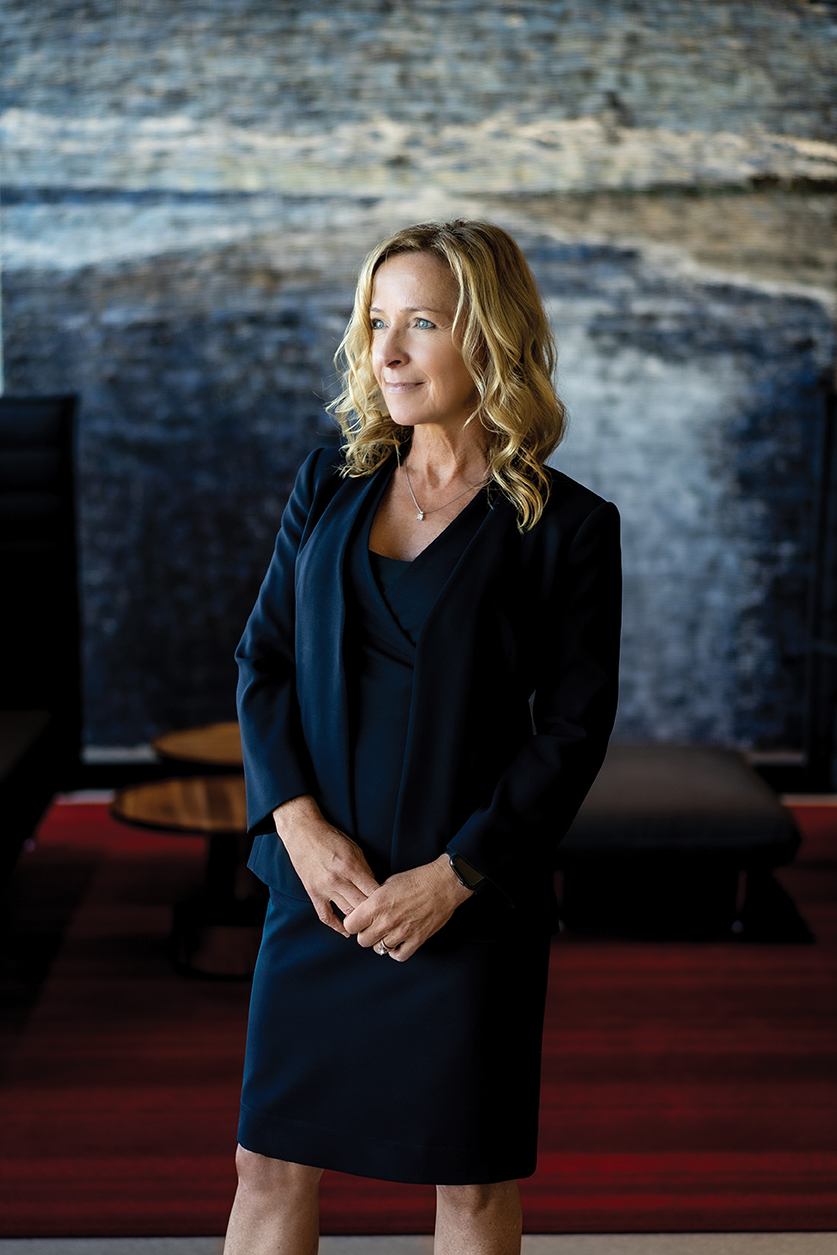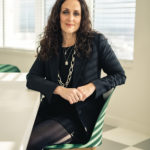Financial gains
Against the odds, these alumnae made it to the top of their field. Now they’re making it easier for those on their heels.

Sandra Bolton, chief integration officer, FS Investments
Against the odds, these alumnae made it to the top of their field. Now they’re making it easier for those on their heels.
Sandra Bolton ’90 has had what many would consider a fantastic career in finance, working at top companies and as a managing director at an asset management firm in Philadelphia. But as a woman in an industry dominated by men, the road has not always been easy.
In one of her first jobs out of college, where she was the only woman on an equity trading desk in New York City, her boss regularly asked her to file papers, as her male colleagues made crude, sexist comments. In another job, the head of her division made it known that he did not like the women who worked for him to wear pants. But the memory that stands out as a cautionary tale happened when Bolton was a young mother. Another working mother in the office shifted her hours to part time, becoming the first senior vice president to be granted that option. Bolton and other female colleagues were thrilled that one of their own had found a way to balance motherhood with a career in finance. Bolton, who had just had her second child, wondered if maybe she could also scale back her hours.
But on the next round of layoffs, the young mother was the first one out the door.
“We all said, ‘So that’s what happens when you go part time.’ That was a lesson for every woman that was also a senior vice president at that firm,” says Bolton, who is now the chief integration officer at FS Investments in Philadelphia.
Bolton witnessed a similar pattern over the next two decades of her professional career. The finance industry attracts women initially, but has a culture that often undermines the qualities they bring to the job, and throws up barriers that make it hard to reach the executive suite.
Women, particularly of color, face daunting odds in finance, according to a 2021 study by McKinsey & Company and LeanIn.org. Although they begin their careers on par with men, accounting for 52% of the entry-level workforce, their numbers slip with each rung they climb. According to the report, 64% of executives are white men and 23% are white women.
“We have been pretty stalled,” says Colleen Ammerman, the director of the gender initiative at Harvard Business School and co-author of the book, Glass Half-Broken: Shattering the Barriers That Still Hold Women Back at Work. “There have been very few pockets where you see growth of women in leadership positions in the last 25 years.”
- Sandra Bolton, chief integration officer, FS Investments
- Elaine Rocha, global chief investment officer, AIG
- Jennifer Graf, director of operations, Renaissance Technologies
- Jamie Cox ’22
The problems for women are cumulative — a lack of mentorship, penalties for motherhood, and biases that hinder female leadership. Tally those together, and women end up shut out of the top echelons. To make meaningful changes, companies need to reconsider their hiring practices, which can reinforce biases, as they aim to recruit women, Ammerman says. The work doesn’t end with an offer letter. Once women and people of color are hired, companies need to provide mentorship to support and nurture their careers.
For Elaine Rocha ’95, the chair of TCNJ’s Foundation Board of Directors and AIG’s global chief investment officer, the lack of diversity in Investments was glaring when she first joined the division in 2015.
“I looked across the trading floor and saw a sea of white men,” says Rocha, a lawyer who had moved to Investments from the legal division. In response, Rocha created and implemented a talent recruitment program to enhance diversity, equity, and inclusion in Investments. She started at the beginning of the pipeline, diversifying the colleges AIG recruited from, with an aim to attract more women and people of color. She drew on her own background as a history major from a working-class family who went on to acquire a law degree as a model for who could work in finance. “If there is someone who is an art major who has the drive and ambition, then why not?” she says.
But women need more than job offers to stay in the industry. They need mentors, like the one Rocha had when she was serving as interim chief of staff for the former general counsel of AIG. The mentor, whom Rocha described as her “work dad,” advised her to sit down with her boss and ask about her next career move. But Rocha was reluctant. “I think most women, we tend to think about proving ourselves first before asking for that next opportunity,” she says. But her mentor thought otherwise, and would counsel her with regular telephone calls on her way home from the city. “Every day on my commute home, he said, ‘Did you talk to him?’”
Finally, she set up a meeting to discuss her next career steps with the general counsel, and after some consideration, he suggested a move to financial services, an option Rocha had not considered. The experience was eye opening. Women need sponsors — senior colleagues who are vested in their careers and who advocate for them on their behalf when they are not in the room.
In the recruitment program she later built, “I made sure people had mentors at every step of the way,” she says. “We need to have mentor and sponsorship programs that legitimately set people up for success.”
Men have long had networking spaces to help grow their careers. They may spend Sunday golfing, or bond over drinks after work. When Jennifer Graf ’96 started working at a hedge fund, she realized she needed her own network.
Graf, the director of operations for Renaissance Technologies, spent the early part of her career at Goldman Sachs, working in private wealth management. As part of a large institution, she felt supported, with plenty of opportunities for mentorship. But the hedge fund world was smaller, and she did not have many connections.
And so, through 100 Women in Finance, an advocacy organization that supports a variety of peer advisory groups, she joined one specific to her field. But the real support network came from a bond she formed with three other women in finance. The group met so regularly that they gave themselves a name — SILKS, which stood for Strong Independent Ladies in Killer Shoes, a nod to the 2013 book, Stiletto Network. “I think that branding has kept us together for easily a decade,” Graf says. “We send each other notes, ‘I need my SILKS.’ It really has created this kind of glue that has kept us together.”
Over the years, SILKS has played a pivotal role in Graf’s support network, giving her a place to commiserate and find support, both professionally and personally. “We get to bring our whole selves to the group. We support each other,” she says. “It is a safe space, a trusted network.”
“We have to figure out: How do we get the word out that this is actually an amazing career for women?” Bolton says. “We have to rebrand.”
Bolton encouraged her daughters to consider careers in finance, even though neither majored in business. She urged them to look beyond the stereotype of a macho, bare-knuckle industry, and join a profession that she sees as noble, one that helps people prepare for the future and retirement.
The industry is driven by relationships and communication, skills women excel at, and should be encouraged to leverage. Both of her daughters now work in financial services.
Sara Motusesky ’21, Bolton’s younger daughter, majored in psychology and never considered a career in financial services until she was living at home with her mother during the pandemic. She listened as Bolton persuaded her to consider the option. “From what I saw my mom go through, with all the commuting to New York City and working until 8 p.m., I saw finance as a cut-throat, devote-all your-time-to-it kind of career,” says Motusesky. She also didn’t think she had the financial literacy to make it work. But her mother convinced her that not everyone in finance works with numbers, that she had a valued skill set, too.
Eventually, Motusesky took a job as a business development consultant at New York Life Investments, and quickly saw how useful her psychology training was to her job. “On a daily basis, I’m interacting with people, I need to know how they think,” she says. “My experience is completely different from what I ever would have imagined.”
But, as the industry is starting to see, it’s not just women who need to do the heavy lifting. Four years ago, Joseph Okaly ’08, a wealth manager at New Horizons Wealth Management in Cedar Knolls, New Jersey, read Lean In by Sheryl Sandberg, the chief operating officer of Meta Platforms. Okaly was transfixed. “She made so many eye-opening points,” he says. “Women get the short end of the stick more often than they should.”
So, he made a commitment to hire more women. When hiring the company’s only intern last summer, he looked for a qualified female candidate. Out of 30 applicants, only two were women.
He landed on Jamie Cox, now a senior at TCNJ, majoring in finance. “After the Zoom call ended, I thought, ‘That was the best interview I ever had,’” Cox says. A few days later, Cox received her offer letter, which included a personal video welcome from Okaly.
During her summer internship, Cox met with the company’s founder and chief executive every week for a private financial advising lesson. Although the office was evenly split between men and women, there were no female advisors.
“That made me want to become an advisor,” says Cox. After spending a summer interning for Okaly, she decided that she wanted to be in his shoes. “I want to be the one advising and meeting with clients,” she says.
In fall 2021, another internship opportunity came up, this time with a female advisor at a different firm. Cox jumped at the opportunity. “I wanted to work under a woman and to learn how she built herself up so that she was taken seriously,” Cox says. “I really wanted to get her perspective.”
Cox recently accepted a full-time position to join Okaly’s team again, starting in June 2022. She will be a client servicing specialist. Armed with experience and some early mentors, Cox says she has no hesitations about entering a male-dominated industry and doing her part to change that: “With confidence and knowledge in the industry, it’s fair game for anyone.”
Pictures: Bill Cardoni
Posted on February 7, 2022





